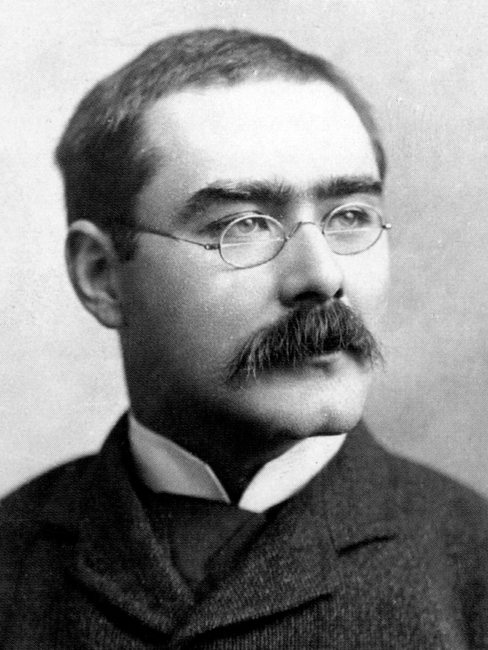You have /5 articles left.
Sign up for a free account or log in.

Rudyard Kipling
Wikimedia Commons
Students at the University of Manchester painted over a poem by Rudyard Kipling because of what they describe as the British author’s imperialistic and racist writings, replacing it with a poem by the African-American writer Maya Angelou.
The Guardian and other British news sources reported that the students painted over the mural with Kipling’s poem “If” -- a mural students had not signed off on -- on a wall at the newly renovated student union building.
Sara Khan, the student union’s liberation and access officer, posted the following statement on Facebook about the decision to paint over it: “A failure to consult students during the process of adding art to the newly renovated SU building resulted in Rudyard Kipling’s work being painted on the first floor last week.
“We, as an exec team, believe that Kipling stands for the opposite of liberation, empowerment, and human rights -- the things that we, as an SU, stand for. Well-known as author of the racist poem 'The White Man’s Burden,' and a plethora of other work that sought to legitimate the British Empire’s presence in India and de-humanize people of color, it is deeply inappropriate to promote the work of Kipling in our SU, which is named after prominent South African anti-Apartheid activist, Steve Biko.”
“As a statement on the reclamation of history by those who have been oppressed by the likes of Kipling for so many centuries, and continue to be to this day, we replaced his words with those of the legendary Maya Angelou, a black female poet and civil rights activist.” Students replaced Kipling’s poem with Angelou’s “Still I Rise.”
Khan did not respond to Inside Higher Ed’s request for comment. The student union issued a statement that reads, in part, "The Union’s officers’ actions to replace the original poem with Maya Angelou’s poem is not vandalism, it is breathing life into a project to make it truly student led. Our officers stood out against the poem not in an attempt to obliterate Kipling from history but because, as an organization, our values promote liberation first. Therefore, the first works created on the union’s walls should be that of a liberation artist. Our officers chose the means they felt appropriate to make that point clear."
The union said it was proud to have "advanced the conversation around the decolonization of the curriculum on a national and global level and encouraged people to celebrate the voices of minority groups… However, the actions of our officers have also incited levels of racist abuse and criticism that are completely unacceptable. We are a learning organization which believes in healthy debate and that no one should be subject to hate or abuse for expressing their feelings." (Note: This article has been updated to include the student union's statement.)
A University of Manchester spokesman, Jamie Brown, said the students did not need permission from the institution to paint over the mural, as the union is independent of the university. “We would consider it a matter for the union,” Brown said.
The action by students at Manchester calls to mind the January decision by Alice Solomon University, in Germany, to paint over a poem painted on a building facade after students complained it was sexist -- a decision criticized by the poet, Eugen Gomringer, as “an encroachment on the freedom of art and poetry.”
It also resonates with various student movements to rename university buildings or remove statues on campus that honor historical figures who have come under fire for their views on race or colonialism. These include the student campaign at the University of Oxford to remove a statue of Cecil Rhodes, a British imperial governor and Oxford benefactor, and student campaigns to rename Yale University’s Calhoun College, named after the pro-slavery U.S. senator John C. Calhoun, and to drop Woodrow Wilson’s name from Princeton University’s public affairs school because of the former president’s racist attitudes and policies. (Of those three cases, only Yale acceded to student demands and dropped the Calhoun name.)
News of the Manchester students' action spread rapidly on student media Thursday, prompting both commendations and condemnations. Some experts on Kipling expressed concern that the work of the Nobel Prize-winning author was being so easily dismissed.
“I think the action is a bit of youthful grand-standing,” Andrew Lycett, a Kipling biographer, said via email to Inside Higher Ed. "There is no evidence that the students have read anything that Kipling wrote. They see him as a symbol of 'imperialism' and related thinking -- notably a lack of enthusiasm for the self-determination of colonized peoples. He was indeed an imperialist; there is no arguing that; it was an essential part of his conservative political credo. However more importantly he was an imaginative genius, who was responsible for some of the finest writing of his age -- from the stories in Plain Tales from the Hills, through poems such as "The Way through the Woods" and children's favorites such as The Jungle Books, to his great Indian novel Kim. When he won the Nobel Prize for Literature in 1907, his citation referred to his 'power of observation, originality of imagination, virility of ideas and remarkable talent for narration.' It is wrong to attempt to erase any written work, and certainly not that of such a creative individual, whose output is on any level better studied -- for both its literary and its historical interest -- than defaced.”
“I think that the students have the right to have what they want on their wall,” Jan Montefiore, a professor emerita at the University of Kent and author of a Kipling biography, said in a phone interview. “But on the other hand I think he’s also a very great writer, a very great and complicated writer, so I’m against them dismissing him as a racist full-stop. That’s not at all the whole story.”
“It seems to me that nobody, student or otherwise, should have the right to dismiss a writer without reading them. The students may or may not have read Kipling, but in any case just saying that he wrote that poem ['White Man’s Burden'], so let’s not learn any more about him, seems to me wrong.”
Kipling’s poem “If,” which takes the conceit of a father’s advice to a son, has often been used as an inspirational poem. It does not touch on issues related to colonialism or race and concludes with the following verse:
If you can talk with crowds and keep your virtue,
Or walk with kings -- nor lose the common touch;
If neither foes nor loving friends can hurt you;
If all men count with you, but none too much;
If you can fill the unforgiving minute
With sixty seconds’ worth of distance run --
Yours is the Earth and everything that’s in it,
And -- which is more -- you’ll be a Man, my son!








